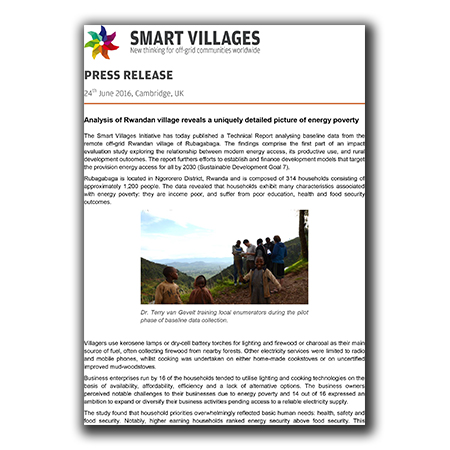The Smart Villages Initiative has today published a Technical Report analysing baseline data from the remote off-grid Rwandan village of Rubagabaga. The findings comprise the first part of an impact evaluation study exploring the relationship between modern energy access, its productive use, and rural development outcomes. The report furthers efforts to establish and finance development models that target the provision energy access for all by 2030 (Sustainable Development Goal 7).
Rubagabaga is located in Ngororero District, Rwanda and is composed of 314 households consisting of approximately 1,200 people. The data revealed that households exhibit many characteristics associated with energy poverty: they are income poor, and suffer from poor education, health and food security outcomes.
Villagers use kerosene lamps or dry-cell battery torches for lighting and firewood or charcoal as their main source of fuel, often collecting firewood from nearby forests. Other electricity services were limited to radio and mobile phones, whilst cooking was undertaken on either home-made cookstoves or on uncertified improved mud-woodstoves.
Business enterprises run by 16 of the households tended to utilise lighting and cooking technologies on the basis of availability, affordability, efficiency and a lack of alternative options. The business owners perceived notable challenges to their businesses due to energy poverty and 14 out of 16 expressed an ambition to expand or diversify their business activities pending access to a reliable electricity supply.
The study found that household priorities overwhelmingly reflected basic human needs: health, safety and food security. Notably, higher earning households ranked energy security above food security. This suggests that households pass a wealth threshold where they begin to prioritise the ability to benefit from an uninterrupted availability of energy sources at an affordable price.
Rigorous standards in the collection and analysis of data were a key feature of the study:
“We were determined to leverage our academic background, through designing metrics and data collection vehicles, undertaking rigorous data analysis, and disseminating results to a wide audience of stakeholders. This approach is vital to ensure that policy and investment decisions can be made judiciously with the backing of reliable and comprehensive,” says Dr. Terry van Gevelt, Project Manager Smart Villages Initiative and Research Associate, University of Cambridge.
Data collection for the study was carried out in collaboration with Afritech Energy Ltd and Practical Action Consulting. The second stage of the study will re-evaluate the village one year after the installation of a mini-hydro project by Afritech Energy Ltd, which will provide electricity access to the community. Dates for the completion of the project have yet to be announced.
“Providing energy access for all is one of the most ambitious of the new Sustainable Development Goals. Of the 1.2 billion people without energy at the moment, a significant number are in remote rural communities with little realistic hope of being connected to the grid by 2030. However, there is a growing consensus that renewable off-grid energy can provide a solution. Through this and additional studies we plan to initiate in other regions, we aim to create the evidence base to convince policy makers and other stakeholders to take action,” says Dr. Bernie Jones, Co-Project Leader, Smart Villages Initiative.









